Clifford Garstang's Blog, page 6
June 17, 2024
I’ve Got Questions for A.L. Sirois
Editor’s Note: This exchange is part of a series of brief interviews with emerging writers of recent or forthcoming books. If you enjoyed it, please visit other interviews in the I’ve Got Questions feature.
 Murder in Mennefer by A.L. SiroisWhat’s the title of your book? Fiction? Nonfiction? Poetry? Who is the publisher and what’s the publication date?
Murder in Mennefer by A.L. SiroisWhat’s the title of your book? Fiction? Nonfiction? Poetry? Who is the publisher and what’s the publication date?Murder in Mennefer – fiction. Publisher: Regal House Publishing. Publication date: June 18, 2024
In a couple of sentences, what’s the book about?In Egypt before the pyramids, during the time of cruel and benevolent gods, thirteen-year-old Imhotep’s hopes of becoming a healer are dashed after the sudden, apparently accidental death of his father, a successful builder, forces the family into penury. Suspicious about his parent’s unusual loss of fortune, Imhotep is forced into an apprenticeship with a cruel, whip-wielding butcher, even as his affection for Meresankh, a baker’s daughter, grows.
What’s the book’s genre (for fiction and nonfiction) or primary style (for poetry)?YA historical
What’s the nicest thing anyone has said about the book so far?There is a very nice review of the book at Small Press Picks.
What book or books is yours comparable to or a cross between? [Is your book like Moby Dick or maybe it’s more like Frankenstein meets Peter Pan?]Murder in Mennefer is a coming-of-age novel, and it owes a lot to The Golden Goblet by Eloise Jarvis McGraw, in that it takes place in ancient Egypt and concerns a boy’s struggle to right the wrongs done to himself and his family.
Why this book? Why now?Well, I have worked on it for nearly twenty years, collecting reference material, and so on, and it remains fresh and alive in my mind. Also, what I want to do is to write books for “reluctant readers,” generally young boys, and turn them on to the thrills of reading and discovery. MIM is the first book of a trilogy, and I’m thrilled to be able to carry Imhotep’s adventures out across three volumes.
Other than writing this book, what’s the best job you’ve ever had?Wow. Tough one. I’ve had two jobs that qualify as “best,” I guess. The first one was working for MAD artist Wally Wood back in the 1970s. I was always a pretty good artist, but unpolished. Working with Wood was the making of me as an artist. The other “best” job was working for the Prodigy online service, where I was able to put my computer graphics experience, gained from a few years doing educational software in the mid-Eighties, to good use. I worked in corporate America for a number of years thereafter.
What do you want readers to take away from the book?The idea of self-reliance, the idea that no one can hold you down. I want to open up the world of history to young folks. Plus, of course, I want to tell a good story.
What food and/or music do you associate with the book?Middle Eastern food, maybe? The ancient Egyptian diet was relatively limited. And we don’t know a lot about their music. But I like world music, and Indian music, so there’s that.
What book(s) are you reading currently?I just finished a fantasy by Seanan McGuire, one of her “October Daye” books. I love those. I’m also reading Splintered, by A.G. Howard, a modern retelling of Alice in Wonderland. (Alice is one of my favorite books.) But I read omnivorously, fiction as well as non-fiction.
 A. L. Sirois
A. L. SiroisLearn more about A.L. at his website.
Follow him on Facebook, Instagram, Bluesky, and LinkedIn.
Buy the book from the publisher (Regal House Publishing), Amazon.com, or Bookshop.org.
I’ve Got Questions for Ahuva Batya Scharff
Editor’s Note: This exchange is part of a series of brief interviews with emerging writers of recent or forthcoming books. If you enjoyed it, please visit other interviews in the I’ve Got Questions feature.
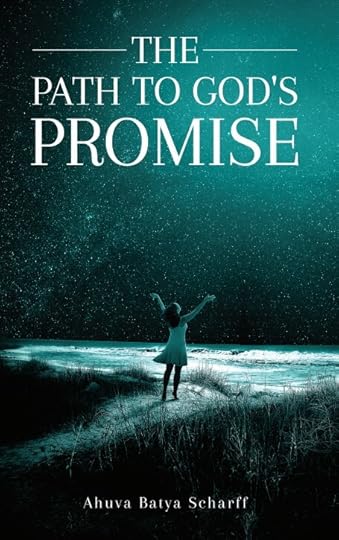 The Path to God’s Promise by Ahuva Batya ScharffWhat’s the title of your book? Fiction? Nonfiction? Poetry? Who is the publisher and what’s the publication date?
The Path to God’s Promise by Ahuva Batya ScharffWhat’s the title of your book? Fiction? Nonfiction? Poetry? Who is the publisher and what’s the publication date?Title: The Path to God’s Promise
Fiction
Publisher: Austin Macauley Publishers
Publication Date: October 13, 2023
In a couple of sentences, what’s the book about?If God asked you to drop everything to become a prophet, to warn the world about climate change, would you? That’s what’s asked of Elinor Simentov in The Path to God’s Promise. Through the story, we travel with Elinor as she is transported to witness horrific past events and a range of potential futures, while she explores her perception of self and relationship with God, and decides whether to accept God’s direction to serve as harbinger and herald for the world.
What’s the book’s genre (for fiction and nonfiction) or primary style (for poetry)?Genre: Visionary Fiction; Jewish Fiction; Dystopian; Cli-Fi
What’s the nicest thing anyone has said about the book so far?A woman at a book signing in Salem, Oregon said to me, “Your book showed me that ordinary, broken people can change the world.”
What book or books is yours comparable to or a cross between? [Is your book like Moby Dick or maybe it’s more like Frankenstein meets Peter Pan?]It’s a bit of an unlikely cross between The Shack and Oryx and Crake. I don’t know of another climate fiction book that relies so heavily on religious experience or text. In a lot of ways, it has parallels with The Alchemist, as it’s very much a story about a spiritual journey.
Why this book? Why now?I am a mental health researcher, focusing on responses to trauma caused or exacerbated by climate change. It has been interesting—and saddening—for me to observe the anti-intellectual pushback and charges of “fake news,” levied against climate scientists. The truth is that more than 99% of climate scientists agree that human activity is causing climate change. Many of those researchers are living in a tent near a glacier or in a desert doing their research, to try to bring the best data to humans to make decisions for our future and generations to come.
Because of the negativity and disbelief that has met so much climate change nonfiction, I thought I’d take a different approach and use fiction to explore the idea of climate change response.
So, I introduced the world to Elinor Simentov, a middle-aged Jewish woman of no renown who is asked by God to serve as a prophet and warn humankind about impending disaster.
Fiction allowed me to go into a character’s interior life—to consider what we think of ourselves and our ability to create change. It gave me the opportunity to explore Jewish ideas about service, spiritual growth, community, and how to deal with competing values. Fiction also provided an occasion to let characters move through time to explore potential past and future scenarios that could make a difference in our real-world decision-making processes.
That said, there is a tremendous amount of science in the book. The scenes of climate degradation and natural disasters are all based on real events. The political scenes are also based on historical situations. For those who say, “These things couldn’t happen,” I can point to the documents that show where these circumstances have already occurred.
There is no more time to wait. If we’re going to abate the worst of projected climate change outcomes, we have to act now.
Other than writing this book, what’s the best job you’ve ever had?I absolutely loved working at summer camps. I spent five seasons at summer camps, mostly with the Girl Scouts, across the Western USA. I also spent three years overseeing a Girl Scout camp property for year-round use. If I could make a good living working at camp, I would still do that work. It is wonderful to serve youth as they explore the outdoor world.
The best thing about Girl Scout camp is that it gave me serious skills that I use when I go on expeditions for my current work, which I also love, as principal investigator for the Institute for Complementary and Indigenous Mental Health Research. I research the relationship(s) between trauma, resilience, and climate change. My research takes me to some of the most remote places on earth where I learn how communities are addressing climate change-related trauma and are resilient despite changes to the foundations of their communities.
What do you want readers to take away from the book?We can stop the worst of the impacts of climate change, but we are not going to “recycle” our way out of the problem(s). To prevent the worst outcomes, our social and economic systems must be radically restructured. I believe that Jewish ideas on justice, compassion, community-mindedness, and wisdom have something to offer that conversation. I explore these ideas in the book and hope that the reader is moved by them.
What food and/or music do you associate with the book?I am Ashkenazi, so I associate matzah ball soup and gefilte fish with the book – because the book is in large part about what it means to have a Jewish soul and the lengths that we are willing to go to for our community.
But it’s also about lack and want, so I think of stockpiled dry and canned goods that are necessary in times of scarcity—about canning in the late summer and putting up for the winter, and providing gifts of those provisions to those who may be old or in other ways unable to prepare for winter or hardship themselves.
As for music, I think of “Hatikva”. The book released a few days after the October 7 massacre in Israel. I was in Ecuador on a research expedition when the massacre occurred and the war began. I had little access to internet service and was desperate to learn about my Israeli friends. I will forever associate the two events. My book is about hope—for Jews, for humankind, and for our planet.
What book(s) are you reading currently?I am currently reading The Cemetery of Untold Stories by Julia Alvarez – it’s quite literally one of the most enchanting books I’ve read. Alvarez deeply appreciates what it means to be a writer and the sometimes overwhelming need to tell stories. I have also been on a binge of Octavia Butler. Last week I completed Fledgling. I love a twist on vampire tales.
 Ahuva Batya Scharff
Ahuva Batya ScharffLearn more about the author on her website.
Follow her on Facebook, Twitter, TikTok, and YouTube.
Buy the book from the publisher, Bookshop.org, Amazon, Barnes & Noble.
June 11, 2024
Reviews, Interviews, and Appearances

The Last Bird of Paradise has been out for a couple of months now and I’ve been pleased with the reaction, although I’m still trying to get the word out about the book. It hasn’t really been flying off the shelves, but the people who have read it seem to like it a lot.
I’ve received feedback in various forms. There have been a couple of book reviews published in magazines so far. Interestingly, both reviewers were writers who had some familiarity with Singapore, where the book is set.
Danielle Hanson reviewed the book in Tupelo Quarterly. Her conclusion: “The Last Bird of Paradise is two stories of women from different periods of time and of different circumstances, but it serves to illuminate gender politics, geopolitical forces, and the results of power imbalance in many forms. Garstang gives us characters and settings that are microcosms of these forces, so the book doesn’t become didactic, but instead, offers complexity and nuance.”
Bill Preston reviewed the book in Peace Corps Worldwide. His review also manages to incorporate impressions of two of my other books, Oliver’s Travels and House of the Ancients and Other Stories.
Reviews in magazines are helpful in reaching readers, and I’m looking forward to the appearance of a few more in the coming weeks. Online reviews by readers can also be very helpful. One common site where readers post their reactions to books is Goodreads:
“Part mystery, part historical, part suspense, Garstang wraps it all in a literary prose that weaves a spell for our unsettling times.”“A well-crafted, engaging, and thought-provoking read.”Most reader reviews appear on Amazon.com:
“This is a page-turner of a novel, with depth and layers, struggles with identity and power, and fascinating parallels to 9/11 in New York and the various terrorist attacks in surrounding SE Asia.”“The Last Bird of Paradise is a beautifully written novel that follows two women whose lives intersect in Singapore, despite living in different centuries.”“Couldn’t put it down.”If you’ve read the book, please consider leaving a reaction on Goodreads or Amazon or both. I would really appreciate it! It’s helpful to widen the book’s reach. And don’t forget to tell your book-reading friends about it. I also think it would be a terrific book club selection.
InterviewsThen there are interviews, where I get to respond at length to questions I’m asked about the book or writing in general. Another writer and I interviewed each other in the Southern Review of Books, and a second interview appeared at Atmosphere Press. Most of my interviews, however, have been in the form of podcasts or videos, which have been a lot of fun to record. Here are links to some of them.
The Writer’s BoneMeter & MayhemBig Blend RadioLiving the Next ChapterPlease check out these wonderful sites that are so supportive to writers!
AppearancesFinally, now that I’m done with the initial flurry of post-publication events and interviews, I’m scheduling appearances for the rest of the year, including talks, readings, and seminars. The list below is complete as of today, but for details and links to the actual events, which will continue to be added, check out the Events page on my website.

June 4, 2024
What’s the Deal with Audiobooks?
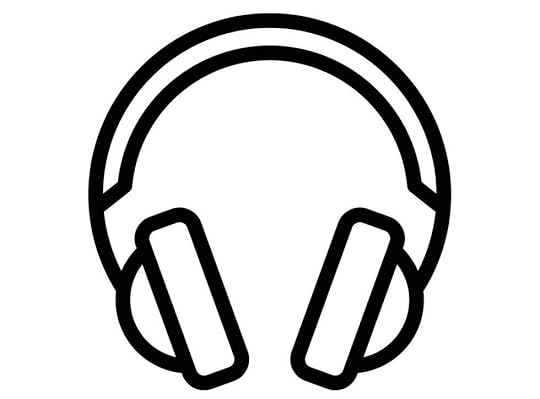
Do you listen to audiobooks? I have friends who listen to books while doing various activities—cooking, housework, exercise. For several years, I’ve been listening to books in the car. At first, the idea was to occupy my mind while driving long distances, but now I listen to a book whenever I get in the car to drive more than a couple of miles (which, living out in the country as I do, is every time). I also like to listen to books while walking on the treadmill at the gym, although when I’m walking on the country roads near my house, I feel it’s important to be able to hear what’s happening around me.
But is listening to audiobooks really reading? Well, no, not in the way we’ve always understood the term. But hearing the words spoken is just another way of consuming the content of a book, so the distinction, if there is one, is without a difference. Although you’ll find a divergence of opinions on the subject, research appears to back me up on this. In fact, I saw an article recently that suggested we retain information we hear better than if we read it on the page.
When my earlier books came out in print, I had a few visually impaired acquaintances ask me about audio editions. I wasn’t yet into audiobooks myself, so I wasn’t aware of how they worked. And because my work is traditionally published by small presses, the format in which the books come out is out of my control. (Mostly. I probably could have worked something out with the publishers, but it wasn’t a priority.)
I was extremely pleased, though, when the publisher of my second novel, Oliver’s Travels, informed me that they had sold the audio rights to an audiobook producer. My sole involvement in the production of that audiobook, which came out in the fall of 2023 (2 years after print publication), was to approve a sample the proposed voice actor/narrator had submitted. I had no problems with the sample, so, after I provided a short pronunciation guide for the words I thought might be problematic (my name, for example, plus some Chinese) the book went into production. And then months went by, and I didn’t hear anything further.
Until, that is, I happened to take a look at my Author Page on Amazon.com and I discovered that the audiobook of Oliver’s Travels was scheduled for release the following week. I never heard from the audiobook producer. I never heard from the publisher. No one ever approached me about promoting the audiobook’s release. I found it very puzzling and still do. Also, although I received an advance on royalties, I wasn’t given a copy of the audiobook. I had to buy one myself from Audible. I still haven’t heard from the publisher about it.
In the meantime, I’ve listened to most of the audiobook at this point, which is wonderfully narrated by Rex Anderson. I’m very pleased with the result.

The process was a bit different for The Last Bird of Paradise. My publisher told me they were looking for a narrator through ACX, the Amazon affiliate that creates audiobooks. Because I know some voice actors (we needed a female voice for this one), I put the word out. The publisher eventually sent me some samples, and ultimately we went with one submitted by Amelie Peterson. And, unlike my previous publisher, when the book was released, they sent me a copy. I haven’t listened to the whole thing yet, but I like what I’ve heard so far.
It’s very odd to listen to someone else read your words. I frequently read to audiences from my work, but, not being an actor, my approach is a little different. I typically read all the text in the same voice, dialogue and all, with only a little dramatic flair, when appropriate. These voice actors, however, when reading the dialogue of different characters, actually make an effort to differentiate the voices, which I’ve enjoyed hearing. I hope you do too.

If you listen to either of these audiobooks, I’d love to hear your feedback!
P.S. You might enjoy exploring other features of my:
I’ve Got Questions: a series of short interviews with authorsReading Journal: every month, I do short summaries of [most of] the books I’ve read that month.Literary Magazine Rankings: updated every December, I provide a ranking of literary magazines as an aid to writers looking for places to submit work.Events: this is where I post information about upcoming appearances.June 3, 2024
Appearances/Events
After the initial flurry of events to promote my new novel, The Last Bird of Paradise, I’ve begun scheduling appearances for the rest of the year. Here’s what I’ve booked so far. To get more information about these appearances and to stay up to date on my schedule, check my Events page.
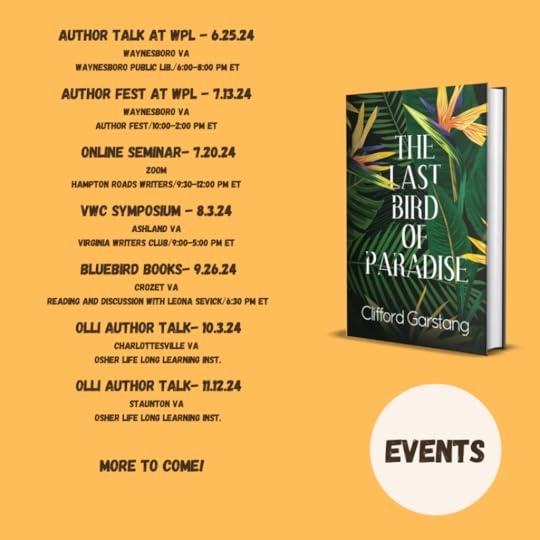
June 1, 2024
2024 Reading–May
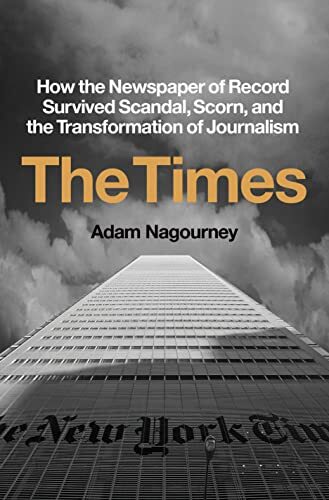 The Times by Adam Nagourney
The Times by Adam NagourneyThe Times: How the Newspaper of Record Survived Scandal, Scorn, and the Transformation of Journalism by Adam Nagourney was my book club’s selection for May. It’s a fascinating account of the internal workings of the most important newspaper in the world. I’m not sure I needed to know all this about the in-fighting, rivalries, poor personnel management, etc., but it was interesting. Also, I never gave much thought to how a newspaper is actually run, especially one that is as widely read as the Times. I’ve been a digital subscriber for many years now, but I was never a subscriber to the print edition (not counting the years I got the International Herald Tribune when I lived in Singapore). Still, I don’t take full advantage of the paper, and I should. For me, the book was slow to start, but as we got closer to the present in the book’s chronology, it got more interesting and relevant.
 What I Know About July by Kat Hausler
What I Know About July by Kat HauslerWhat I Know About July by Kat Hausler is a novel set in Berlin, by an American writer who lives there. It centers on Simon, a German singer/songwriter whose band has become popular in the local indie-rock scene. But Simon has a problem: a young woman has been stalking him and he’s uncertain of her intentions. In the meantime, he sleeps with other fans, has a poor track record with girlfriends, and is generally neurotic. The band goes on tour in several German cities and elsewhere, including Amsterdam, where the stalker goes missing. Simon is relieved, but also worried, so he reports this to the police in Berlin. He’s a suspect, of course. She doesn’t go missing until about halfway through the book, though, so it’s a long build-up, and the rest of the story is the search for her and the revelation of what happened. I think I would have structured this book differently, but I still enjoyed the read because of the clever writing and dialogue, plus the Berlin setting, which was familiar to me.
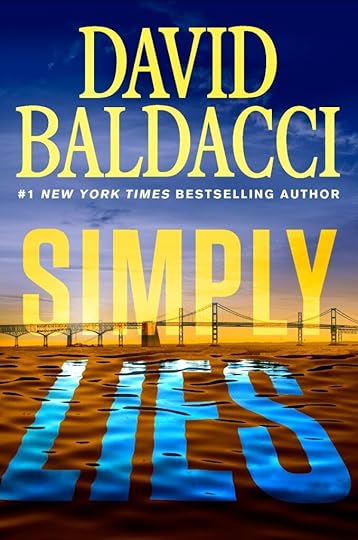 Simply Lies by David Baldacci
Simply Lies by David BaldacciSimply Lies by David Baldacci is the first novel in his new series about a former cop named Mickey Gibson. Gibson is a divorced single mother of two young kids and she’s now working mostly online for a private investigative firm. Out of the blue, she gets a call from a woman who claims she works for the same firm and gives Gibson an assignment to check out a mansion. That’s unusual because she works mostly on the internet, and when she gets to the mansion, she discovers the body of a man who has been murdered. The man himself is a mystery because no one knows who he is, and the woman who set Gibson off on this investigation keeps pushing her to do more. Almost no one is who they say they are—lots of false identities—which is kind of fun, but a bit too manipulative for my taste. The novel is entertaining, but it lacks plausibility.
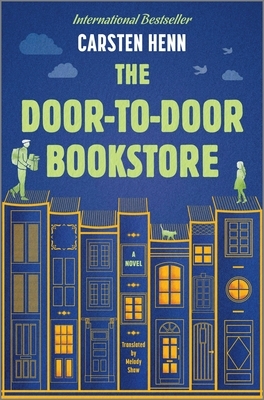 The Door-to-Door Bookstore by Carsten Henn
The Door-to-Door Bookstore by Carsten HennThe Door-to-Door Bookstore by Carsten Henn is a novel translated from German by Melody Shaw. The title of the book in German is Der Buch Spazierer meaning, literally, “the book walker,” which I think would have made a much better title in English. It’s a sweet story about Carl, an older man whose job in a local bookstore in a German city is to hand deliver books to customers. He goes on daily walks to make his deliveries, and he revels in his chats with his customers as well as observing what’s happening in his city. One day he is joined by a nine-year-old girl who is full of questions, and while he tries to get rid of her at first, he gradually grows quite fond of her. His customers also succumb to her charms. The girl’s father, however, is not pleased with the arrangement and steps in to stop it, leading to one of the book’s major conflicts, although there are others. It’s a sweet story and an enjoyable read.
 Coyote Weather by Amanda Cockrell
Coyote Weather by Amanda CockrellCoyote Weather by Amanda Cockrell is described as a novel of the 1960s, which it certainly is. The book is about Ellen and Jerry from Ayala (a fictionalized Ojai) California, who meet and fall in love one summer. Ellen is in college back east (at a fictionalized version of Hollins University, where the author went to school and also taught) and Jerry is just getting by. He doesn’t dig school, but he’s also worried about the draft. Eventually, they split apart and lead separate lives, coping with the horrors of the Vietnam war, which is claiming the lives of their friends from Ayala. Ellen eventually marries someone else, but she’s frustrated by society’s limitations on women, and she also pines for Jerry. The book is a very well-written account of the period as a backdrop to a moving story.
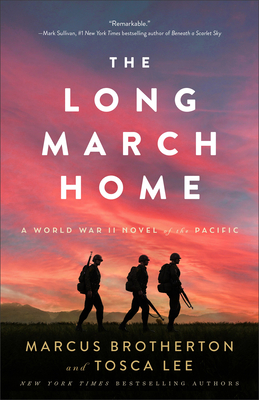 The Long March Home by Marcus Brotherton and Tosca Lee
The Long March Home by Marcus Brotherton and Tosca LeeThe Long March Home by Marcus Brotherton and Tosca Lee is a familiar World War II story. Three friends growing up in Mobile, Alabama join the army as war nears. They ship out to the Philippines, where they are just settling in at a supply base when Japan bombs Pearl Harbor and then immediately overruns the Philippines, resulting in the Bataan Death March of POWs. Despite their courage, many prisoners die during the war, and the reader wonders if all of the friends will make it back to Mobile. The grim story of their experience in the camps is interspersed with stories about their lives before the war, which mostly revolve around a girl—sister to one of the friends and the love interest for the other two. I can’t deny that the book is affecting, although it seems like a story we’ve all heard before.
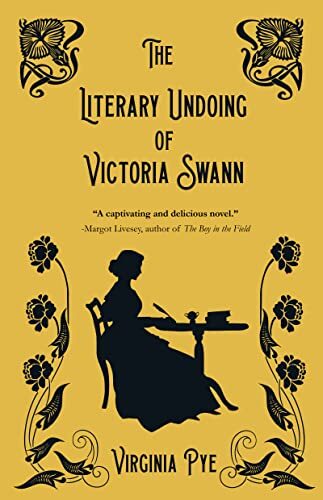 The Literary Undooing of Victoria Swann by Virginia Pye
The Literary Undooing of Victoria Swann by Virginia PyeThe Literary Undoing of Victoria Swann by Virginia Pye. This novel set in late 19th Century Boston is a departure for Pye, whose previous work touched on China. (There’s a little China, here, too, as a brothel/opium den is populated with Chinese immigrants.) For the most part, the landscape of Cambridge and Boston isn’t significant (although the main character does have a house on Brattle Street, which was familiar to me, and eventually visits the famous Longfellow House to meet with Alice Longfellow), but the literary environment of publishing houses and important writers is the real reason for the setting. The story centers on Victoria Swann, a writer of cheap diversions for women, who fights back against her publisher when she discovers she’s being cheated by them. She has other problems, too, including a bit of scandal in her background and an opium-addicted husband she doesn’t love. It’s an enjoyable read that touches on an interesting historical development.
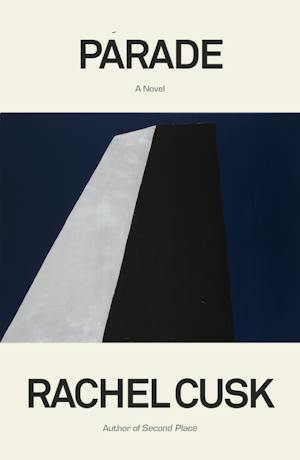 Parade by Rachel Cusk
Parade by Rachel CuskParade by Rachel Cusk is a novel I was asked to review for the Washington Independent Review of Books. (My review will appear online in June.) It’s a challenging book that I struggled to understand because it mostly doesn’t have a plot. It is made up of four sections and in each there is an artist at the center, referred to as G. But these are different people, so it’s never clear to me why they’re all called G. They all have their own challenging relationships and situations, but the point, if there is one, seems to be what motivates them in creating art. I’m not sure I got out of the book what the author intended.
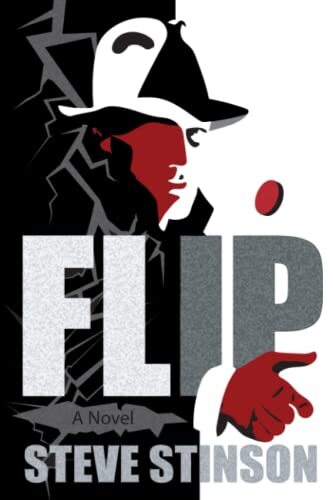 Flip by Steve Stinson
Flip by Steve StinsonFlip by Steve Stinson surprised me. It’s a novel about an artist who, at 19, seems headed nowhere. He’s a mess, his girlfriend is pregnant, and her family hates him. With her encouragement, he gets out of town. On the road, he meets a stranger who asks him where he’s headed. Good question. He flips a coin by way of choosing. Flash forward and he’s now an editorial cartoonist for an Atlanta newspaper, about to hit the big time by way of syndication. But he meets a stranger again, flips a coin, and finds himself in the life he didn’t have, married to the girlfriend he’d left earlier. But he’s happy with his life in Atlanta! He flips back and forth, and how he lands is an interesting spiritual debate he has with the man who may or may not have saved his life years before. Another enjoyable read.
 The Hint of Light by Kristin Kisska
The Hint of Light by Kristin KisskaThe Hint of Light by Kristin Kisska is, for the most part, a charming novel, although it has a twist. It’s about a young man who dies at the beginning of the book after struggling for many years with alcoholism. Before he died, he revealed to his father that he apparently had fathered a child with a woman he’d had a brief relationship many years earlier, and the father only tells the family this after his son’s death. At the heart of the story, then, is the effort to understand the son’s relationship with his child and to see what connection, if any, the child will have with her father’s family.
May 13, 2024
I’ve Got Questions for Sean Murphy
Editor’s Note: This exchange is part of a series of brief interviews with emerging writers of recent or forthcoming books. If you enjoyed it, please visit other interviews in the I’ve Got Questions feature.
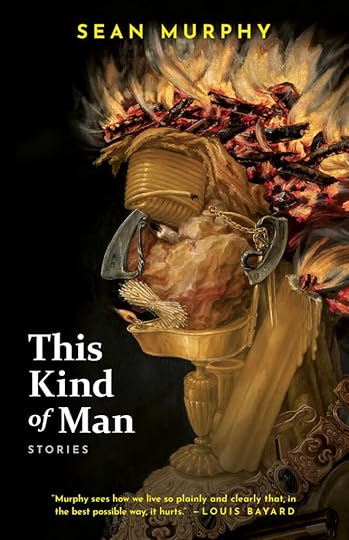 This Kind of Man by Sean MurphyWhat’s the title of your book? Fiction? Nonfiction? Poetry? Who is the publisher and what’s the publication date?
This Kind of Man by Sean MurphyWhat’s the title of your book? Fiction? Nonfiction? Poetry? Who is the publisher and what’s the publication date?This Kind of Man, my first collection of short fiction, was published by Unsolicited Press on May 7, 2024.
In a couple of sentences, what’s the book about?This Kind of Man offers an unvarnished look at life in 21st-century America, excavating the complicated, tender, wild truth of what it is to be a man across generations and relationships. We see that our received notions of manhood and masculinity are inculcated—from the beginning and by design—to ensure willing participation in a system where the overwhelming majority are excluded from the start. We witness the way these dysfunctions are handed down like inheritance, and how every cliché, from fighting to drinking to intolerance of dissent and distrust of others, is a carefully constructed trap, preventing solidarity, empathy, and love (for others, for oneself).
What’s the book’s genre (for fiction and nonfiction) or primary style (for poetry)?Short story collection.
What’s the nicest thing anyone has said about the book so far?I was fortunate to receive some wonderful and generous blurbs. Louis Bayard, best-selling author of The Pale Blue Eye, writes“This Kind of Man, a suite of dramatic monologues and meditations, seems to pick up where Raymond Carver left off: anatomizing all the ways that American masculinity finds itself adrift, with a special thought for the women in the same lifeboat. Murphy sees how we live so plainly and clearly that, in the best possible way, it hurts.”
What book or books is yours comparable to or a cross between? [Is your book like Moby Dick or maybe it’s more like Frankenstein meets Peter Pan?]While I would hesitate to draw any flattering comparisons between myself and these two masters of the short story, I believe This Kind of Man is in the vein of both George Saunders and Tim O’Brien (thinking especially of In Persuasion Nation and The Things They Carried), as it seeks to take an unflinching look at people in crisis, describing the ways this world has pushed them to some type of breaking point. Several of these stories take place in so-called flyover states, so I feel obliged to send a loving shout out to the great Breece D’J Pancake, who wrote so indelibly about Appalachia.
Why this book? Why now?Glad you asked! Like anyone in America, I’ve read more than my fair share of increasingly urgent if equally unsatisfactory features about why everyone is so angry. A decade ago, many of these discussions would occur in classrooms and pubs, or at the proverbial workplace water cooler, but today, the internet allows the aggrieved to opine at top volume, social media keeping score in a game no one can win.
Somehow, despite these digital bullhorns, many people still claim to feel unheard, unacknowledged, or lost in the mass of info and entertainment overload. Too often, what passes for political discourse involves another lazy interview with some dude in a diner in the Midwest or else sneering Op-Eds from the same well-paid columnists. The media is neither able nor especially interested in telling these stories with any complexity or desire to expose the real rot: a system entirely stacked against all but the wealthiest and most connected members of our society.
So: no one seems satisfied, but why is it invariably men who make the most noise? There are too many reasons to count, but in 2024, it seems safe, if overdue, to suggest that traditional masculinity is a dying brand. This is at once inevitable and in almost all regards, a welcome development, but we need to better explore (and explain) who is feeling left behind, why (and how) they will make themselves heard if not with words (hint: actions, which tend to speak loudly and leave collateral damage in their wake).
Other than writing this book, what’s the best job you’ve ever had?I spent many years, before, during and after college, in the service industry. It not only was mostly rewarding (and remunerative) work, but I truly met a diverse cross-section of people, from the upper class to immigrants who routinely held two jobs and worked harder than any Americans I’ve seen. I learned a great deal, was constantly reminded how unbelievably fortunate and privileged I’ve been, and the individuals I encountered did—and do—inspire characters in my own writing. (I have to add, I lived through the dot.com boom and bust, and the antics on display informed my first novel Not To Mention a Nice Life.)
What do you want readers to take away from the book?If I’ve done my job, readers will come away from this book with more curiosity about people they may neither know nor understand, and perhaps cultivate some empathy for fellow Americans that are either overlooked or entirely dismissed in both newspapers and most fiction. I’m certainly not offering any apologies for any men who behave badly (quite the contrary), but I think the best way to initiate a more positive dialogue is to look at some of the causes of this anger and disenchantment (hint: it didn’t begin in 2016, and is unlikely to improve anytime soon).
What food and/or music do you associate with the book?Several people described in these stories confront the fact that, for a variety of reasons, their lives have become unmanageable due to their addictions. Opiates and other drugs make cameos, but bourbon and beer are the elixirs of choice. In my opinion, part of establishing a more positive discussion about the destructive cycles of silence and rage we see amongst certain men requires an interrogation of the ways alcohol is (always has been?) inextricably associated with almost every social activity in America.
What book(s) are you reading currently?One wonderful aspect of running a literary non-profit is having an endless supply of ARCs from amazing writers. I’ve had a busy semester, so I’ve let my to-do list get painfully long, but I am indescribably excited to jump in and get reading, just in time for summer!
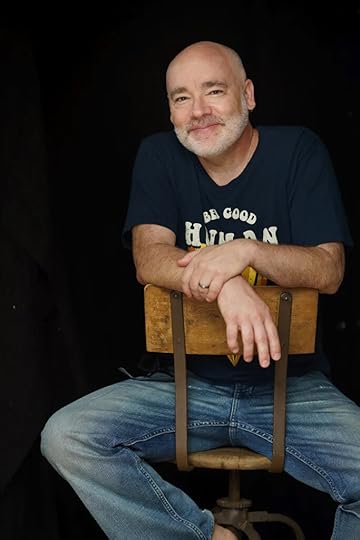 Sean Murphy
Sean MurphyLearn more about Sean on his website.
Follow him on Twitter.
May 3, 2024
THE LAST BIRD OF PARADISE wins Maxy Award

I was very pleased to learn yesterday that my most recent novel, The Last Bird of Paradise, has won an award for Literary Fiction, the Maxy Award. The award is a little unusual in that it recognizes very recent or forthcoming titles as opposed to books published in the previous calendar year, which is the norm. The novel will also be considered for some of those recognitions as well.
The Last Bird of Paradise, which came out in February, is a novel about two women who move, reluctantly, to Singapore. One of the women is a New York lawyer who arrives in the country in 2002 when her husband accepts a job with the Singapore office of a global investment bank. In the process of settling in, she acquires antique paintings done by the other woman, an English artist who was sent in 1914 from England to Singapore, then a British Colony, to live with her uncle. The women have somewhat parallel lives, with global tensions giving rise to violence in both time periods. As one reviewer noted, the book is “part history, part romance, part corporate intrigue,” so there’s something for everyone.
The book is available at Amazon, of course, and can be ordered at your favorite independent bookstore.
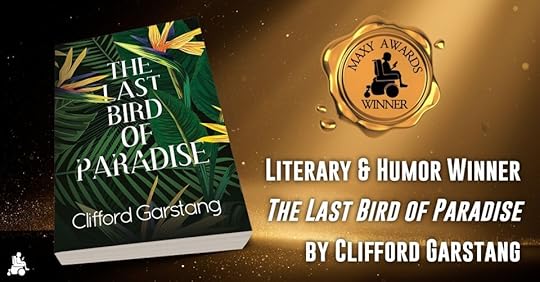
April 30, 2024
2024 Reading–April
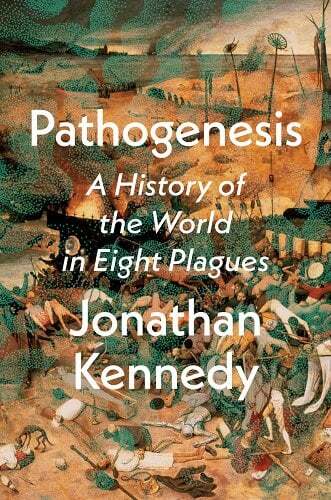 Pathogenesis by Jonathan Kennedy
Pathogenesis by Jonathan KennedyPathogenesis: A History of the World in Eight Plagues by Jonathan Kennedy was my April book club selection. I found it fascinating. From the hypothesis that Neanderthal and other early human species died out from infectious diseases that homo sapiens brought with them when they left Africa, to the brutal assessment of the handling of Covid-19 by the liberal West, the book may not be a history of the world, but it is certainly a revealing discussion of the role such diseases have played over time. Some of the ideas—that Europeans brought deadly diseases with them to the Americas, devastating the indigenous populations—were not new, but the detail and scale of the problem were. I listened to the author read the book, and unfortunately, I found it a little hard to follow, as the timeline was rather jumbled. I wish I had had the book in front of me to help me keep track.
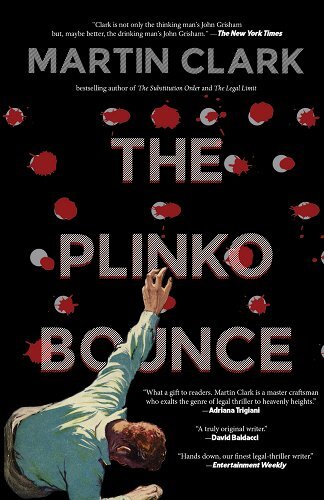 The Plinko Bounce by Martin Clark
The Plinko Bounce by Martin ClarkThe Plinko Bounce by Martin Clark is a mystery set in Virginia, which seemed a good enough reason to read it. Clark writes legal thrillers/mysteries and this one centers on a public defender who is tasked with defending a lowlife drug addict who has confessed to killing the wife of a prominent businessman. From the beginning we learn that there is a technical problem with the Miranda warnings read to the defendant by his arresting officer, and with that opening the killer changes his story, denying that he committed the crime. This puts the public defender in a tough spot because he has to represent a guy he knows is very bad news. The PD is also going through some stuff in his personal life, and there are some interesting wrinkles (that don’t matter much in the end) in the life of the murder victim and her family. And entertaining mystery.
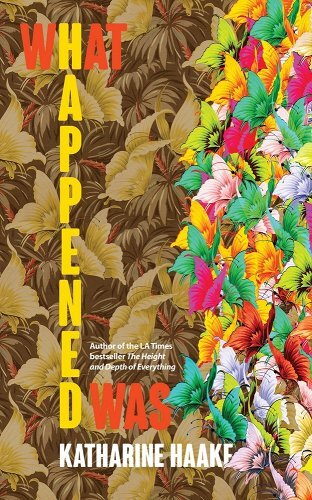 What Happened Is by Katherine Haake
What Happened Is by Katherine HaakeWhat Happened Was by Katharine Haake (April 2024) is a book I was asked to blurb: The “postworld” as revealed in Katharine Haake’s immensely imaginative new book of speculative fiction, What Happened Was, is frightening and inevitable, yet oddly comforting. With playful charm and lyrical prose that sometimes masks the horrors of this new world, Haake takes the reader on an unforgettable tour of landscapes that are both familiar and startlingly new. Provocative and beautifully written, this is a reading experience like no other.
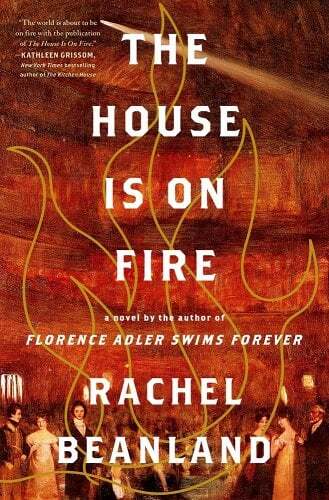 The House is on Fire by Rachel Beanland
The House is on Fire by Rachel BeanlandThe House is On Fire by Rachel Beanland is a historical novel set in Richmond, Virginia in 1811 based on an actual event. During a performance at the Richmond Theater, the set catches fire from a candle and burns to the ground, killing a great many people. The story follows four people in the aftermath of the fire: a widow (and daughter of the former Governor, Patrick Henry); a young stagehand; an enslaved man who saves more than a dozen lives; and an enslaved woman who had accompanied her mistress to the theater but, of course, was seated in a different section. It’s an engaging story revealed with satisfying detail of the period. Before I read the book, I attended a talk the author gave about her sources and the extensive research she did, as well as the liberties she took to fill in the gaps.
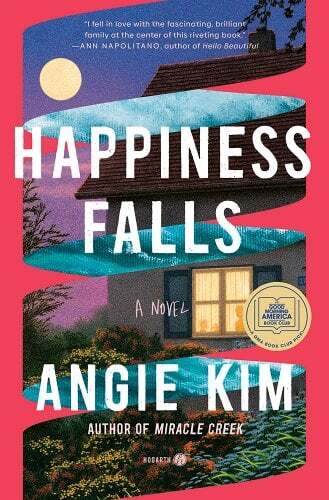 Happiness Falls by Angie Kim
Happiness Falls by Angie KimHappiness Falls by Angie Kim is an engaging story narrated by a college student who is at home with her parents and brothers because of the pandemic (and, also, it’s summer break). Mia’s voice is annoying (intentionally, because she’s described as being hyperlexic, which is borne out by the narrative). She talks about what is happening at length and with long flashbacks when connections come to mind. Her tale, which is retrospective because she clearly knows how things turn out, begins when her autistic younger brother arrives home without their father, who should be with him. The rest of the book is trying to figure out what happened to the father, and one way they do that is by attempting to communicate with the non-speaking boy using disputed therapy techniques.
 The House of Eve by Sadeqa Johnson
The House of Eve by Sadeqa JohnsonThe House of Eve by Sadeqa Johnson is a story set in 1948 in Philadelphia and Washington about two African American women whose stories at first seem completely separate. There is Eleanor, a student at Howard University in DC, and also Ruby, a high school girl in Philly who aspires to be a doctor. Their experiences are similar. Eleanor falls in love with a med student, the son of a wealthy black family, and fears that she doesn’t fit into their environment. Ruby falls in love with a Jewish boy and encounters even more difficulties. These relationships have their ups and downs, both seemingly doomed because of class and racial differences and disapproving parents. Eventually, as the reader suspects, the lives of Eleanor and Ruby will intersect.
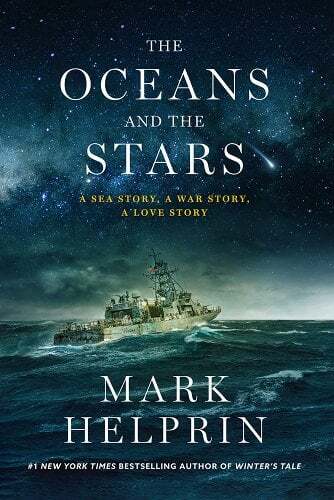 The Oceans and the Stars by Mark Helprin
The Oceans and the Stars by Mark HelprinThe Oceans and the Stars by Mark Helprin is a novel and, I think, the first of Helprin’s that I’ve read. It begins with a reference to a Navy Captain’s court-martial, but then we immediately jump to what he did that got him into trouble. As an aide to the Secretary of the Navy, the Captain spoke his mind in front of the President about the value of PCs (Patrol Coastal vessels) which the President wants to do away with in favor of bigger ships. As punishment, the captain is sent to command a PC, which would be below his rank, and his career is basically over. Then a war breaks out and the captain is a hero, which pisses the President off. Oh, and there’s a romance, too, between the captain and a tax lawyer. While I appreciated the court-martial scenes, the rest of it was far too detailed for my taste (ships, battles, gruesome deaths), and the romance too contrived. But, at 500 pages, it’s an impressive work.
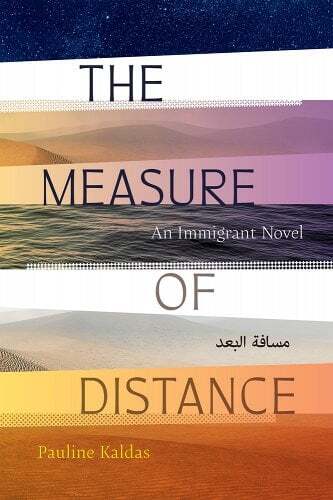 The Measure of Distance by Pauline Kaldas
The Measure of Distance by Pauline KaldasThe Measure of Distance by Pauline Kaldas is a novel that is similar to The House on Sun Street, which I also read recently. While that book was about an extended family affected by the revolution in Iran, here we have an extended family that experiences and anticipates upheaval in Egypt. That upheaval leads many members of the family to emigrate, some to the US, others to Canada or elsewhere. While the language is lyrical and moving, there’s a lot of family history that is simply told, making it less compelling. Also, like the Iran novel, there doesn’t seem to be an overall arc to the book. Still, it was a pleasant read and made me keen to read more about Egypt.
April 24, 2024
The Small Screen x 3
Imagine The Last Bird of Paradise as a movie. That’s not what I was thinking as I wrote it, but in the two months since the book came out, I’ve heard often that readers would love to see a film made of the woven narratives of the two main characters. After all, it’s got a lush, tropical setting, political and corporate intrigue, and sizzling romance.
While I have no control over whether a movie might be made of the novel, it already has been made into three short “book trailers,” each focused on one aspect of the novel. Have you seen them? They’re on my YouTube channel and I’ll link each of them below, too. (If you’re a TikTok user, they’re there, too.)
Art plays an important role in the novel. Not only does the main character, Aislinn, who moves to Singapore in 2002, see movement and stories in the paintings she studies, but paintings are what connect her to another character, Elizabeth, who arrived in Singapore in 1914. The first trailer focuses on the paintings.

Aislinn is married to Liam Connolly, a banker, but she is drawn to Martin Roy, a Eurasian art dealer who has much to teach her about Singapore. Elizabeth, in 1914, is infatuated with Captain Charles Bingham, an officer with the British regiment that is tasked with protecting the colony from German invaders. The second trailer deals with romance.
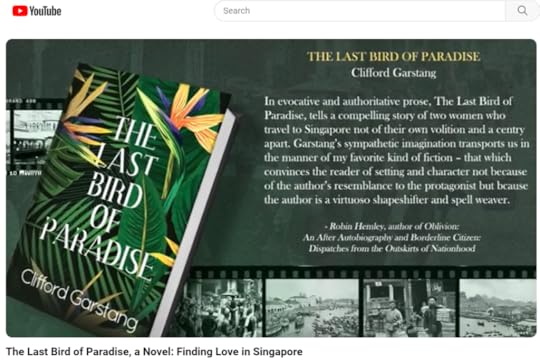
The story isn’t all about love and art, however. World War I had an impact on Singapore that most people don’t know about. And while Liam and Aislinn fled New York after 9/11, it is impossible to escape the dangers of global terrorism. The third trailer focuses on terror.

Please check out the trailers, and then read the book! The Last Bird of Paradise is available from booksellers everywhere, including Amazon, Bookshop, and Barnes & Noble.



